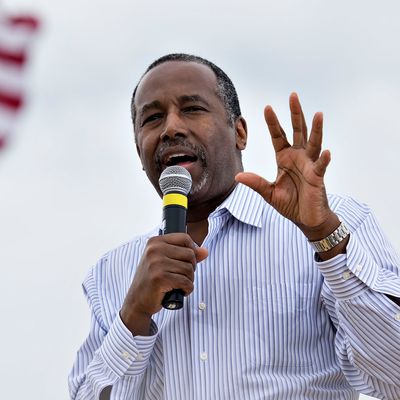
No candidate had a better August than Ben Carson: For the last month, he’s been surging to the top of the heap in Iowa without anyone noticing that it was happening. On Monday, a Monmouth University poll showed the pediatric neurosurgeon and political neophyte tied with Trump in Iowa; on Tuesday, a Des Moines Register/Bloomberg Politics poll showed him in second place, five points behind the front-runner. Now, both the national and Iowa-based poll averages are showing him in second place.
Carson’s climb really started to pick up in earnest two weeks ago, around the time of his speech at the Iowa State Fair. Watching his performance, it’s easy to see how he got there. What Carson delivers is completely unlike the typical stump speech — he sounds more like a motivational speaker than a politician. He tells his life story: Growing up poor in Detroit, his family had barely enough money to afford a ticket to the Michigan State Fair, and he got caught up in the negative influence of his peers in high school. In spinning the narrative of his life, in which he overcomes the disadvantages of his upbringing to be the youngest chief of pediatric neurosurgery in the country at Johns Hopkins University, and later the first surgeon to successfully separate conjoined twins, Carson presents himself as a shining beacon of personal responsibility — a message Republican audiences love. He laments the lack of civility in our culture, especially in politics. “We the American people are not each other’s enemy. The enemies are the people trying to make us think we’re each other’s enemies,” he says. “Just because you disagree with someone about something it doesn’t make them your enemy.” He delivers a rapid-fire lesson on the functioning of the human brain — speaking so quickly his words slur together and are indecipherable — a strange disquisition designed to impress audiences with his intelligence. He thanks the people of Iowa for “supporting me and showing that we shouldn’t let the political class pick our presidents.” And he closes by arguing that “we have to talk about God” more in our political discourse.
It wasn’t the most coherent stump speech ever delivered, but that wasn’t the point. Carson was giving Iowa Republicans an effective mishmash of what they want to hear from their GOP candidates, delivered with the sunny but mellow bedside manner of a doctor. While Trump is playing the role of reality-TV villain, Carson appears to have learned to deliver his barbs in a more Iowa-friendly way. And because he refuses to engage in the process of attacking his fellow candidates, they haven’t found a way to stop him from rising in the polls. Trump, for example, won’t go after him because he only goes after the candidates who attack him. “I cannot hit him,” he told fans in South Carolina last week. “He has been so nice to me!”
Of the other major players in the race, only Cruz is refraining from attacking the front-runner, choosing instead to buddy up to Trump in the hope that he benefits from his eventual demise. So, while the rest of the candidates tear each other down, Carson remains by far the most well-liked candidate in the field, with a 68/14 favorability rating, according to Public Policy Polling’s latest national poll.
But Carson’s propensity for speaking off the cuff seriously damaged him during his last turn in the spotlight. He likened Obamacare to slavery, a statement he tried, unconvincingly, to walk back after the fact. He declared that being gay was a choice, a statement he had to flat-out apologize for. And he accused Obama of being a “psychopath” in a GQ profile earlier this year (he later admitted this was “probably not” the most helpful comment he’s ever made, but refused to disavow it).
“I’ve learned how to phrase things in a way that people can actually hear what I’m saying,” Carson recently told Fox News. Maybe he has, or maybe there’s another explanation: that Carson is doing well precisely because he’s stayed under the radar. On Wednesday, his campaign manager, Barry Bennett, told the Washington Post that “getting some time at the microphone” was the single biggest hurdle he faced to winning the nomination. “The [Ben Carson] life story is the most compelling political story in a long, long time. To know it is to become an admirer,” he said. “Every other candidate in the field has to drive over the back of other candidates to get the nomination. DBC just has to be himself and spread the word of who he is, how he got here, and what we need to do together to save this country.” There’s almost no doubt he’ll get more time at the media’s microphones after the last few polls — the question is, after a month of doing well without it, whether he should really want it.





























